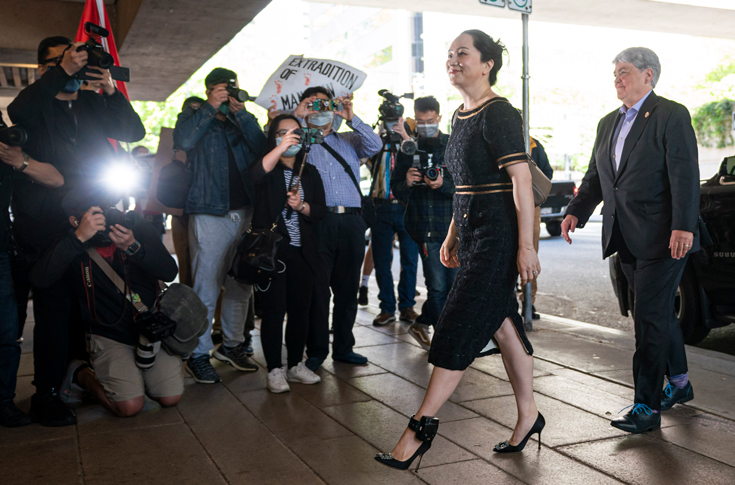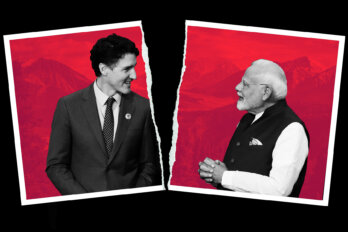In June, a coalition of nineteen former politicians, public servants, academics, and public figures addressed a letter to prime minister Justin Trudeau, urging the government to take a bold, unprecedented step: a prisoner trade between Canada and China. The eclectic mix of signatories, which included former Liberal foreign affairs minister Lloyd Axworthy, Supreme Court justice Louise Arbour, NDP leader Ed Broadbent, and Conservative foreign affairs minister Lawrence Cannon, argued that the government should halt the extradition case of detained Chinese national and Huawei CFO Meng Wanzhou, who faces fraud charges in the United States. In so doing, the letter writers reasoned, the door could be open for China to reciprocate by releasing “the two Michaels” (Michael Kovrig and Michael Spavor), Canadian expats who were detained in China shortly after Meng’s December 2018 arrest.
By the time of the letter-writing, the outlines of the Meng case had become widely reported. The daughter of Huawei’s billionaire founder and a prominent figure in China, Meng was arrested during a stopover at the Vancouver International Airport due to allegations that she had manipulated a US-based bank into financing Huawei’s trade activities in Iran. The alleged act was in violation of US sanctions, so Meng was detained at the Americans’ behest. If extradited and convicted, Meng is facing up to thirty years in a US jail.
In the meantime, the two Michaels have become a Canadian cause célèbre. The media have described them as de facto hostages seized by China in retaliation for Meng. The two face serious (if unreasonable) national security charges and have remained in a Chinese jail, in allegedly spartan conditions with minimal family contact and limited consular access since the start of COVID-19. In a June interview with the CBC, Kovrig’s wife, Vina Nadjibulla, argued that the two Michaels’ lives were at risk.
The letter was not the first attempt by credentialed Canadians to press Trudeau to broker a deal in the Meng case. But the response from the Trudeau government was withering. A day after the letter went public, Trudeau pushed back in a press conference, contending that to concede to China would embolden hostage takers and suggest that the government could be blackmailed. He dismissed suggestions that the country’s leaders should intervene in an “independent” court process. Across the country, editorials, including one in the Globe and Mail, supported Trudeau’s line and demonized China. Certain media would later conflate details of the Meng case with reports of other Chinese abuses, including the government’s treatment of the Uyghurs and the Hong Kong protesters—seemingly to drive home the argument that China is a rules-flouting superpower that should be constrained, not bargained with.
Amid all the crossfire, one element in this escalating international standoff seemed absent from the discussion: that the US’s request to detain and extradite Meng was itself a deeply political act. The effect of this omission is consequential. Proposals to release Meng have been reduced to a debate of head versus heart: the humanitarian concern for “the two Michaels” competing against concern for Canada’s judicial independence. But factor in the American element, and Canadians are compelled to ask rather different questions. Meng’s arrest came at a time when the Trump administration was escalating tensions with both China and Iran. In detaining Meng and moving forward with her extradition, our courts have become tools of Donald Trump’s foreign policy—an agenda that Canada does not always share. Over the past four years, our government has been cautious to a fault when it comes to not antagonizing the Trump administration, but now, with a new American administration incoming, our political leaders can use the opportunity to assess the Meng case from a new perspective: caught between two competing superpowers, freeing Meng may be the just thing to do.
In the US, the decision to make an extradition request lies with the top bureaucrats in the Department of Justice—all political appointees who can be hired or fired at will by the president. Because not all indictments made by district federal courts result in extradition requests, this is a discretionary matter dependent on the bureaucrats’ and the administration’s priorities. Over the last four years, Trump’s crass attempts to bully and influence the Department of Justice toward certain actions have been evident. It wouldn’t be surprising if this led, at least in part, to Meng’s arrest.
It would be wilful ignorance to disregard two foreign policy priorities that the Trump administration was acting on in 2018. First, in May, the US reneged on the nuclear deal with Iran that the Obama administration and European powers had signed in 2015. The deal involved sanctions relief in return for curbs on Iran’s nuclear enrichment, and after unilaterally leaving the agreement, the Trump administration sought to isolate the country once again. Second, in November, then attorney general Jeff Sessions announced the government’s new China Initiative: an aggressive drive by the Justice Department to combat perceived cases of intellectual property theft by China. Around the same time, officials were fretting publicly about the security consequences of letting Chinese internet providers—Huawei in particular—penetrate the US market.
Meng’s alleged crime as CFO of Huawei dates back to 2013—two years before Barack Obama’s Iran deal—when she is said to have lied about the company’s involvement in an Iran-based subsidiary when soliciting a loan from a branch of HSBC. Meng’s legal team contests the allegation, but if the charges are true, Meng would indeed have manipulated the bank, exposing it to potential losses in the form of fines for violating US sanctions on Iran. Still, as far as criminal cases go, this is a charge that at least one expert has argued would not normally rise to the level of an extradition request.
However, Meng’s arrest took place in the context of these two campaigns in US foreign policy battles. A few months after announcing its withdrawal from the Iran deal in May 2018, the US slapped sanctions back on Iran and began threatening countries that bought Iranian oil. Against this backdrop, the logical effect of Meng’s arrest would be to create a chilling effect among investors contemplating doing business in Iran and further choke Iran’s economy.
There is no doubt that the charges against Meng are, technically, justified by US law. But what is egregious about Trump’s abandonment of the Iran deal and subsequent campaign against Meng is that it can undermine faith in the international treaty system. The world is full of unpalatable regimes, and at the same time, there are substantive, transnational issues that need to be dealt with through diplomacy—arms control, territorial disputes, climate change, and human rights among them. Canada has an interest helping to maintain a world order where war is not the fallback mechanism for resolving these disputes. But, for treaties to work, there has to be a generalized trust that all parties will honour their commitments. By waging economic warfare against Iran, Trump contravened the essence of his predecessor’s promise. Canada, meanwhile, chose not to condemn the US’s trust-breaking behaviour but rather to condone and even facilitate it.
But the Meng case goes beyond a dispute with Iran. When it comes to US relations with China, there are other forces at play. On December 11, 2018, ten days after Meng was arrested, Trump explicitly politicized the case by stating, in an interview with Reuters, that he would consider facilitating Meng’s release as part of a trade deal with China. This eagerness to link one woman’s fate with trade concessions raises the uncomfortable prospect that Meng’s arrest might have been prioritized not because of the merits of the case against her but to gain political advantage.
To be sure, the US (and Canada) have a laundry list of grievances against China. There are allegations of intellectual property theft accusing Huawei of targeting US companies. American conservatives consider the company to be an unfair competitor because it has benefited from research-and-development grants from the Chinese government. Also, the US and its allies have voiced concerns that Huawei 5G technology could be used for espionage, filtering information from NATO countries back to the Chinese government.
US concerns may be legitimate. And it may be prudent to consider China as a strategic competitor and consider steps, including the exclusion of Huawei 5G technology from our countries, to minimize the security risk (something the US has done and the Canadian military has recommended). But, all these conflicts aside, Trump’s focus on using Meng as a bargaining chip raises the question of whether her arrest was simply hostage-taking by another name.
Meng may be an executive at Huawei, but it would be monstrously unethical to target her for her country’s many alleged misdeeds. Yet, by inflating a relatively narrow charge of sanctions-dodging into a public spectacle, this is exactly what the Trump administration has done. If Canada is complicit in this, not only will it be an abasement of Canadian values, it could even be construed as condoning behaviour that approximates what China has done with the two Michaels: taking civilians, under a legal pretext, to make a political point. It is hardly in Canada’s interest to help bring about a world where this kind of behaviour is normalized.
In the two years since Meng’s arrest, Trudeau and deputy prime minister Chrystia Freeland have stuck religiously to the line that extradition cases in Canada are decided exclusively by the courts, that our country is built on the rule of law. But this is a dodge. On a procedural level, after a suspect is arrested in accordance with an extradition request, it is the federal Ministry of Justice that makes the decision whether to proceed and enable the Crown to argue for the suspect’s extradition in front of a judge. Once a judgment is made, the case goes to the politically appointed justice minister, who once again has the discretion to extradite the suspect or refuse. The 1999 Extradition Act specifically empowers the minister to take into account the political context and motives of the foreign country making the extradition request when arriving at a decision. In a ten-page legal brief concerning the Meng case, addressed to the minister of justice last May, celebrated Toronto lawyer Brian Greenspan argued that, even in cases where the evidence against a person subject to an extradition request may be true, the justice minister is empowered to evaluate whether there is a policy motive behind the decision to prosecute and, if so, whether that motive is compatible with Canada’s national interest.
Canada still has a choice to make—the legal decision to extradite Meng will likely be made sometime in 2021. And, though there are now rumblings that the US is trying to strike a deal of its own with China to release Meng in exchange for an admission of wrongdoing, Canada shouldn’t wait to act. The US prosecution of Meng has always been political, and the Liberals should finally treat it as such. It’s not too late for our leaders to stop enabling the Trump regime’s conflicts with both China and Iran—especially since that regime has been repudiated by American voters and will soon cease to exist.





